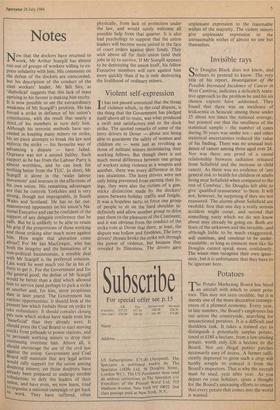Violent self-expression
It has not passed unnoticed that the threat of violence which, in the coal dispute, is the thing that the Government has pledged itself above all to resist, was what produced a swift and satisfactory end to the dock strike. The quoted remarks of some of the lorry drivers in Dover — about not being able to guarantee the safety of women and children etc — were just as revolting as those of militant miners intimidating their working fellows. But though there is not much moral difference between one group of workers using violence as a weapon and another, there was every difference in the two situations. The lorry drivers were not only being prevented from earning their liv- ings, they were also the victims of a gim- micky distinction made by the dockers' union between holiday traffic and freight. It was a hopeless tactic to force one group of people to sit on the hard shoulder in- definitely and allow another group to drive past them to the pleasures of the Continent; and it was obvious from the conduct of the strike vote at Dover that there, at least, the dispute was hollow and frivolous. The lorry drivers' threats broke the strike not through the power of violence, but because they revealed its flimsiness. The drivers gave
unpleasant expression to the reasonable wishes of the majority. The violent miners give unpleasant expression to the unreasonable wishes of almost no one but themselves.










































 Previous page
Previous page